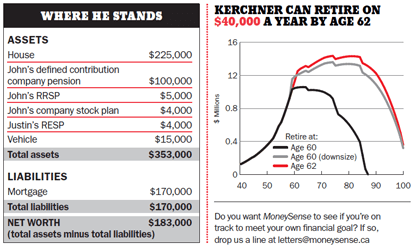Am I on track to retire at age 60?
John Kerchner hopes to retire early and live off $40,000 a year.
Advertisement
John Kerchner hopes to retire early and live off $40,000 a year.
 Do you want MoneySense to see if you’re on track to meet your own financial goals? If so, drop us a line at [email protected]
(Photograph by John Zada)
Do you want MoneySense to see if you’re on track to meet your own financial goals? If so, drop us a line at [email protected]
(Photograph by John Zada)
Share this article Share on Facebook Share on Twitter Share on Linkedin Share on Reddit Share on Email